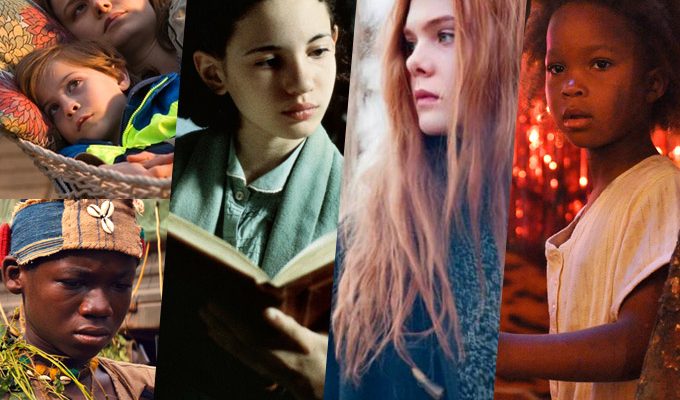 Elle Fanning in “Ginger & Rosa”
Elle Fanning in “Ginger & Rosa”
Again, it’s possibly surprising that we’re going for this lesser-seen performance from Elle Fanning, when a couple of years before she was more or less the co-lead of Sofia Coppola‘s “Somewhere” but while she was very solid in that film, it was Sally Potter‘s “Ginger and Rosa” that feels more like it tested her as an actress. And it is a test she passes with flying colors, along with co-star Alice Englert; her Ginger is a wonderfully intense turn, that captures all the difficulties and casual cruelties of a friendship between teenage girls. It’s certainly Potter’s most mainstream, accessible film and as a whole it feels like she’s working a little outside her comfort zone with some on-the-nose scripting, but Fanning does a phenomenal job of carrying us along with Ginger’s every mood and thought, and always locates the emotional truth beneath the sometimes awkward dialogue.
Thomas Turgoose in “This Is England” (2006)
One of those child performances (alongside the also-British “The Selfish Giant” from this list) that feels so authentic it’s practically documentary, Turgoose’s problem child Shaun is one of the most indelible characters writer/director Shane Meadows ever created, possibly because he’s partly autobiographical. The diametric opposite of “cute,” Shaun is truculent and difficult, lashing out at schoolmates, while still processing the death of his soldier father in the Falklands War, but he’s also so impressionable it just kills you to watch him be seduced into a toxic ideology. Discovering a surrogate family in a gang of skinheads who adopt him first as a mascot and then eventually as a fully-fledged member, Shaun negotiates his first crush and his hero worship of the virulently right-wing gang leader, Combo (Stephen Graham, electrifying), and Turgoose is simply brilliant, completely un-self-conscious as a boy growing up way too fast just because he wants so desperately to belong.
Ivana Baquero in “Pan’s Labyrinth” (2006)
Perhaps the strongest single element of Guillermo Del Toro‘s tremendous fantasy is its sense of balance between the real and the imaginary — entirely encapsulated in that perfectly ambivalent happy/sad ending. And as Ofelia, the girl at the heart of the both of the film’s worlds, Ivana Baquero needs to walk that line constantly. What’s truly surprising is how unshowy a turn it is, as she is both the audience surrogate on these forays into a grotesque and beautiful underworld, and also the protagonist who often makes decisions we ourselves might not. Baquero plays Ofelia as a grave, quiet, courageous child, totally un-self-pitying, which makes it all the more remarkable how much that ending packs an emotional punch: we’ve come to identify and empathize with her so incrementally and yet so completely by the film’s close, that it almost happens without our noticing, because there’s so much else spectacular and weird to see.
Abigail Breslin & Rory Culkin in “Signs” (2002)
Cheat double entry, and yes, we should probably have Breslin here for her Oscar-nominated titular role in 2006’s breakout hit “Little Miss Sunshine,” but though her part in M Night Shyamalan‘s unjustly disliked “Signs” is tiny, it was immediately striking, and it came four years earlier. Just five at the time of shooting, there’s nothing of the stage-school brat about Breslin: she’s sweet without being sickly and funny without being forced. And a lot of the time she plays opposite Rory Culkin, her wise elder at 12 years old, who announced himself here as possibly the most naturally gifted product of the Culkin child-star farm. There’s a lovely care that exists between the two of them, a sibling chemistry that far more experienced actors might have trouble in accessing. Culkin had already impressed as younger Igby in “Igby Goes Down” and in Kenneth Lonergan‘s “You Can Count on Me” and would do so as a lead in 2004’s “Mean Creek,” but for many of us “Signs” was when we started to take note of both these kids as actors whose range belied their ages.
Waad Mohammed – “Wadjda” (2013)
Haifaa al Mansour’s movie probably shouldn’t exist at all: a product of the not-exactly-prolific Saudi Arabian film industry, directed by a woman in spite of the restrictions of that society, and reliant on a single, debut actress of just 10 years of age. But Waad Mohammed plays her role so authentically it feels like anything but a performance giving the title character a spirited energy, as she works toward her goal of owning a forbidden bike in the suburbs of Riyadh. Later in the film, Wadjda realizes that her best chance to get the bike is to pretend to be a good, obedient student and win a Koran recitation competition. As so the actress is given enem more room to impress, as she plays a young girl pretending to follow the rules so she can ultimately break them, a kind of role-with-a-role, which becomes an elegant, defiantly feminist parable for the making of this film and for that whole society at large.

